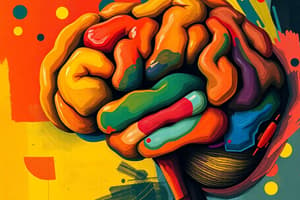Podcast
Questions and Answers
What best describes the function of memory as a 'time machine'?
What best describes the function of memory as a 'time machine'?
- It only allows re-experiencing recent events.
- It enables the retrieval of information from the past. (correct)
- It helps individuals avoid recalling past information.
- It permanently erases memories of the past.
Which type of memory involves identifying previously encountered information without the ability to fully recall it?
Which type of memory involves identifying previously encountered information without the ability to fully recall it?
- Recall memory
- Episodic memory
- Recognition memory (correct)
- Relearning memory
Which statement accurately differentiates recall memory from recognition memory?
Which statement accurately differentiates recall memory from recognition memory?
- Recall is used for skills while recognition is used for facts.
- Recall retrieves memories from long-term storage; recognition identifies past encounters. (correct)
- Recall is typically faster than recognition.
- Recall does not require conscious thought while recognition does.
What is a key benefit of relearning memory techniques?
What is a key benefit of relearning memory techniques?
What is a defining characteristic of recognition memory?
What is a defining characteristic of recognition memory?
Which of the following best describes the interference theory in memory retention?
Which of the following best describes the interference theory in memory retention?
What is the primary cause of absentmindedness?
What is the primary cause of absentmindedness?
Which of the following factors is NOT one of the main causes of forgetting?
Which of the following factors is NOT one of the main causes of forgetting?
Which type of interference occurs when new learning disrupts the recall of previously learned information?
Which type of interference occurs when new learning disrupts the recall of previously learned information?
What enhances memory retention through continued practice after initial learning?
What enhances memory retention through continued practice after initial learning?
Which strategy is used to help minimize interference when learning new material?
Which strategy is used to help minimize interference when learning new material?
What characterizes sensory memory?
What characterizes sensory memory?
Which of the following improves memory retention through better organization of material?
Which of the following improves memory retention through better organization of material?
Which of the following statements about short-term memory is true?
Which of the following statements about short-term memory is true?
What is the primary characteristic of amnesia?
What is the primary characteristic of amnesia?
What primarily determines the capacity of short-term memory (STM)?
What primarily determines the capacity of short-term memory (STM)?
Which type of memory requires a conscious recall of information?
Which type of memory requires a conscious recall of information?
What term refers to memories associated with specific step-by-step procedures?
What term refers to memories associated with specific step-by-step procedures?
Which of the following best describes how information is stored in long-term memory?
Which of the following best describes how information is stored in long-term memory?
Which aspect of memory involves recalling facts and events in a holistic manner?
Which aspect of memory involves recalling facts and events in a holistic manner?
What type of memory is often referred to as 'non-declarative'?
What type of memory is often referred to as 'non-declarative'?
Which of the following is NOT a characteristic of long-term memory?
Which of the following is NOT a characteristic of long-term memory?
Which type of memory specifically includes personal individual experiences?
Which type of memory specifically includes personal individual experiences?
Flashcards are hidden until you start studying
Study Notes
Overview of Memory
- Memory enables coding, storing, and recovery of past information, functioning as a "time machine" for mental travel.
- It supports rapid retrieval of learned information, aiding daily tasks and skill application.
- Memory is essential for recalling experiences or facts, representing both recent and distant memories.
Types of Memory Measurement
- Recognition Memory: Identifying previously encountered information without deep recall, allowing for quick recognition.
- Recall Memory: Actively retrieving specific information from long-term storage, such as titles or facts, emphasizing retention over time.
- Relearning Memory: Enhancing memory recall through repeated exposure, which is typically faster and strengthens retention.
Causes of Forgetting
- Ineffective Encoding: Shallow processing leads to poor memory retention; deeper cognitive engagement improves memory.
- Decay Theory: Memory deteriorates over time, especially for sensory and short-term memories. Long-term memory decay is less time-dependent.
- Interference Theory: Forgetting occurs due to interference from other memories, categorized into:
- Proactive Interference: Older memories disrupt learning of new information.
- Retroactive Interference: New information impairs recall of previously learned tasks.
- Cue-Dependent Forgetting: Retrieval failure occurs without appropriate memory cues, involving:
- Semantic Cues: Associations with related memories facilitate recall.
- State-Dependent Cues: Memory is easier to retrieve in the same emotional state as when it was encoded.
- Context-Dependent Cues: Memory is enhanced in the original context where it was learned.
- Absentmindedness: Lack of attention during information encoding leads to memory lapses, such as forgetting where items were placed.
- Blocking: Retrieval failure occurs when related memories interfere, commonly experienced as the "tip-of-the-tongue" phenomenon.
- Amnesia: Memory loss due to damage in the temporal lobe or hippocampus, affecting the ability to recall specific experiences.
Strategies for Enhancing Memory
- Rehearsal: Regular practice reinforces memory retention for learned material.
- Overlearning: Continuing practice after initial mastery improves long-term retention.
- Minimizing Interference: Avoid studying similar materials too close together; adequate resting reinforces new learning.
- Deep Processing: Engaging meaningfully with material through elaborative techniques enhances retention.
- Organizing Information: Structuring material hierarchically or using chunking methods aids memory recall.
- Mnemonic Devices: Utilization of strategies like acronyms, acrostics, or rhymes facilitates memory recall.
Memory Stores
- Sensory Memory: Briefly retains unprocessed sensory information (1-4 seconds); showcases raw perceptions.
- Short-Term Memory (STM): Temporarily holds processed information for about 1 minute; requires focus for retention.
- Long-Term Memory (LTM): Vast storage capability; retains information indefinitely. Types include:
- Explicit Memory: Conscious recall of facts and experiences, further divided into:
- Declarative Memory: Conscious memory of facts (semantic) and experiences (episodic).
- Implicit Memory: Unconscious memory for skills and procedures, including but not limited to:
- Procedural Memory: Memory for the execution of tasks and skills without conscious awareness.
- Explicit Memory: Conscious recall of facts and experiences, further divided into:
Stages of Memory
- Input and perception of stimuli occur through sensory organs, transferring to sensory memory for a brief duration.
- If attended to, information moves from sensory to short-term memory, requiring active focus.
- Encoding connects new information with existing knowledge, facilitating transition to long-term memory for extended retention.
- Retrieval allows access to stored information for future use, dependent on effective encoding and storage practices.
Studying That Suits You
Use AI to generate personalized quizzes and flashcards to suit your learning preferences.



